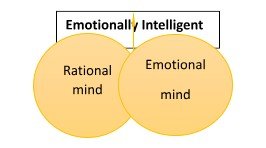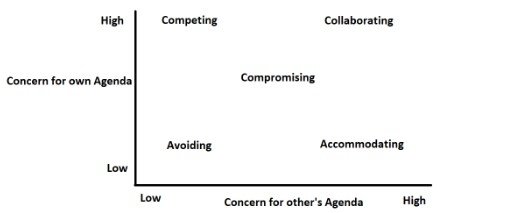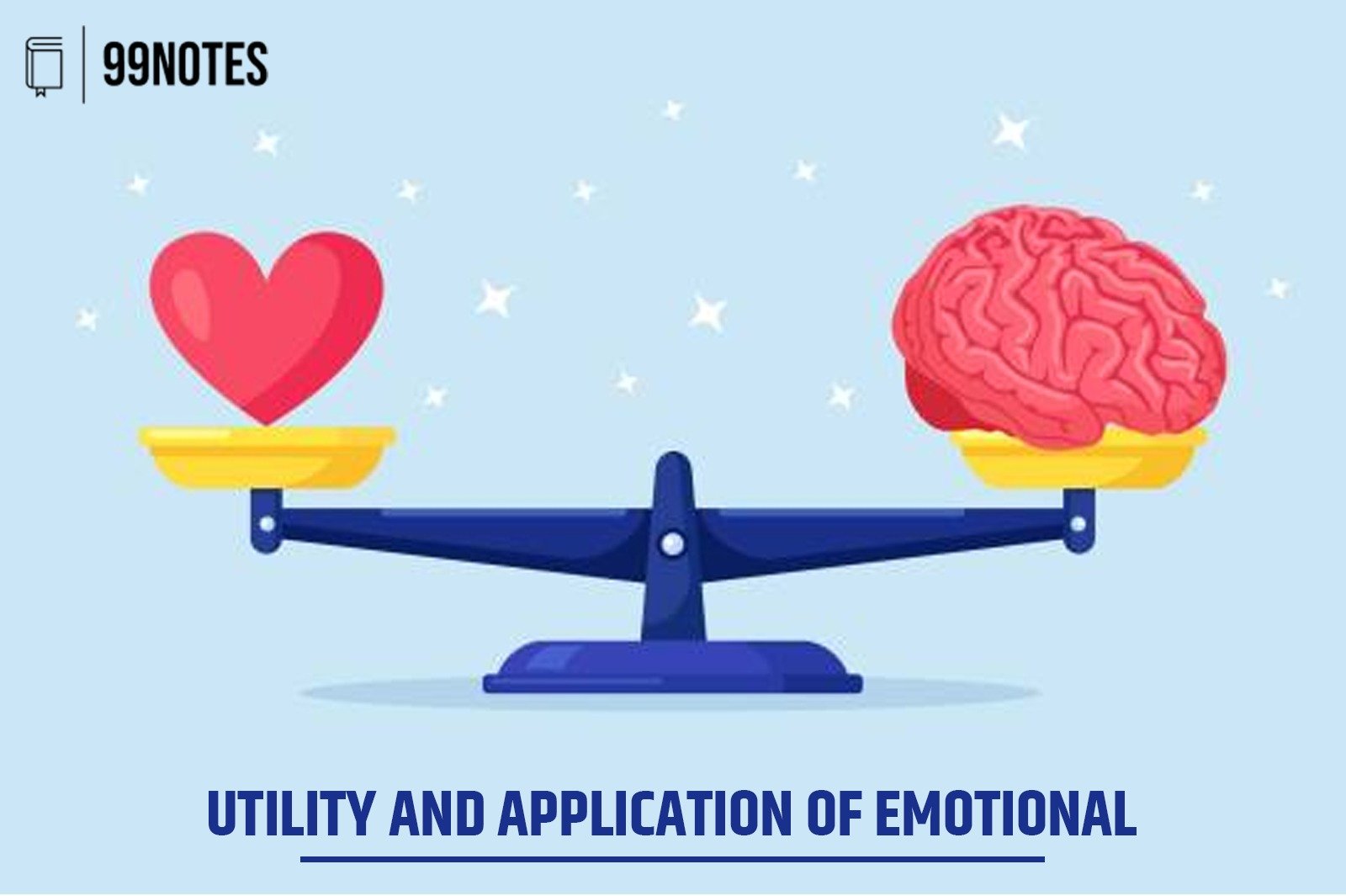Utility and application of Emotional Intelligence
We find that Emotional Intelligence is a highly useful skill in nearly every walk of life. In this chapter, we have discussed several such areas of utility.
Benefits of Emotional Intelligence:
- Benefits of Emotional Intelligence:
- Mental health and well-being:
- Importance in managing conflicts:
- Areas of Application
- Utility of Emotional Intelligence in administration and governance:
- Personal context:
- Systemic Challenges in Bureaucracy in the Application of EI
- Improving Emotional intelligence (EI):
- Communication Training:
- Conclusion :
- FAQs related to Utility and application of Emotional Intelligence
Emotional intelligence (EI) is significant in every aspect of life. Due to this, the study of EI has steadily gained traction in recent times. Some of these benefits are:
- Leverage the power of emotions: Allows individuals to tap into not just thinking capacities but also leverage information and strengths that emotions bring.
- Takes a realistic and practical view of emotions as opposed to traditional notions that encourage leaving emotions out of certain contexts and encourage unhealthy suppression.
- Facilitates understanding of self and others beyond superficial information.
- Encourages and enables empathy so that the quality of interpersonal interactions improves.
- Adds competitive advantage over just cognitive intelligence and technical skills so that individuals are able to pursue excellence and success using a range of intelligence.
- Allows individuals more agency and control over which emotions they would like to experience more of and which ones they consider undesirable in a given situation and would like to switch from.
Thus, the benefits of emotional intelligence have implications across a wide range of our lives, from personal relationships to professional contexts and settings.
Further, it has several benefits in our own lives individually such as in managing conflict and mental health.
Mental health and well-being:
- In recent decades, health and illness patterns have changed most societies. Unhealthy lifestyles, chronic stress and complexities associated with health behaviours have given rise to novel health issues and chronic illnesses.
- Contemporary biopsychosocial models of disease construe health and illness as an amalgam of biological, psychological, and social factors.
- Recently, the role of emotions in the health processes has also been emphasised. Given this conceptualisation, EI may serve as a protective factor for healthy outcomes.
- A major conceptual pathway that links EI to positive health outcomes passes through the construct of well-being. Both mental health professionals and primary health workers focus on restoring and promoting a sense of well-being in the individual.
- Two kinds of well-being have been recognised by the researchers – hedonic or subjective well-being and eudaimonic or psychological well-being.
- Hedonic well-being involves the realisation of happiness, pleasure attainment and pain avoidance, while eudaimonic well-being refers to the fulfilment or actualisation of one’s full potential.
- Eudaimonic or psychological well-being emphasises personal growth,
mastery, life purpose and meaning, and has been associated with indices of physical and mental health and is relevant to prevention and health promotion.
Importance in managing conflicts:
- Conflicts can arise in any environment, be it home and family, among friends or in workplace relationships.
- EI helps in dealing with interpersonal issues and conflicts more constructively, resulting in a better choice of conflict management skills. The usage of constructive styles, in turn, helps foster better social relationships and reduces the probability of further conflict.
- The behavioural patterns that individuals employ to deal with conflicts or conflict management styles have been differentiated into two dimensions: concern for self and concern for others.
- Based on these two dimensions, five styles of handling conflict have been identified, viz. integrating, obliging, dominating, avoiding and compromising.

Areas of Application
Application of EI at the workplace:
- Interpersonal competencies and social skills are crucial assets for achieving success at work.
- With the increasing complexity of tasks, collaborations across countries and cultures and increasing business negotiations, emotional intelligence has been recognised as the central pillar of professional success.
- Two main components of EI that contribute majorly to success at work are empathy and social skills.
- Empathy not only facilitates interpersonal collaboration but also reduces the propensity for prejudice, aggression, and violence.
- Social skills considered important at the workplace primarily concern managing interpersonal interaction, resolving conflicts, and negotiation.
- Effective communication, collaboration with others, cooperative efforts to achieve targets, and effective team-making abilities are also essential parts of social skills.
Utility of Emotional Intelligence in administration and governance:
Emotional intelligence (EI) has gained much significance, not only in academic and management domains but also in various other fields such as sports, administration, governance, and other setups.
Traditionally, Max Weber gave the concept of “ideal bureaucracy”. He proposed that the most appropriate way to run an organisation is to structure it into a rigid hierarchy of individuals governed by strict rules and regulations.
Weber identified five main characteristics of bureaucracies. They include specialisation and division of labour, formal written records, competence for job appointments, standard operating procedures and impersonality in bureaucracy.
Often, scholars and leaders opined that without emotional intelligence, not only the administrator can’t work effectively, but also the citizens are not being governed in the best possible ways. Which ultimately leads to the violation of the social contract and development goals in the long run.
Generally, an administrator interacts at 3 levels:
Intra and inter-organisational interaction:
- Emotional intelligence in the workplace gives a boost to creativity and innovation for team-building, better performance and solving conflicts.
- Emotionally intelligent civil servant keeps his staff motivated by acting as a role model.
- Emotional intelligence helps administrators maintain healthy relationships within their organisation in order to improve the work culture and optimum use of available financial resources.
- Organisations may have challenges such as frequent transfers, gender inequality, the glass ceiling effect and sensationalisation of events by media; emotional intelligence plays an important role in handling such situations effectively without any influence.
Administration-citizen interface:
Bureaucracy was seen as the iron cage of rationality from which bureaucrats would not have any escape. The ideal bureaucracy is the one that establishes perfect control and order. However, in the long run, it proves to be fatal as it creates its own set of challenges.
However, Governance without considering the will of the people often leads to decisions that are not liked by the people and are not in their larger interests.
People in the bureaucracy are extremely ethical and really want to have a democratic attitude and want to serve society. However, there are several systemic issues that prevent the Civil Servants from working in the best interest of the people which can be done with the help of EI.
- Civil servants have to be compassionate, innovative and responsive to deliver quality services to the citizens.
- An emotionally intelligent civil servant is able to adapt to a changing environment. It enables civil servants to handle criticism positively and avoid frustration in the workplace.
- Lack of emotional intelligence leads to issues of exclusionary policies, corruption and diversion of resources.
- The public accepts an emotionally intelligent officer as a neutral person who helps him/her in building trust, and trustworthy officers are able to navigate through difficult circumstances like communal tension as all the communities involved have trust in him/her.
- Thus, emotional intelligence on the part of the administrator creates a sense of belonging and collective ownership of resources in the administrator as well as in citizens.
Personal context:
- In a democracy like India, civil servants are the role models for many youths, which makes their personal as well as public life prone to constant public scrutiny.
- The nature of the job involves transfer and postings in remote areas, which in turn adversely impacts their family life, disrupting children’s education, marital conflict and loss of social circle.
- Emotional intelligence enables them to maintain balance in their personal life and avoid these situations.
Systemic Challenges in Bureaucracy in the Application of EI
It is not always possible to act emotionally intelligently in Bureaucracy. There are several Systemic challenges that prevent us from applying EI in the Bureaucracy. 
Work Pressure:
There is excessive work pressure on the administrative unit, which leads to the development of a “do whatever it takes approach,” and leads to frustration amongst the people in service.
For Example, an army jawan was recently thrashed for forgetting his driving license by some police authority.
Emotional intelligence helps in self-control. A person with the right aptitude can never do such wrong.
Cultural and Emotional Gap:
There is a huge cultural gap between the administrative unit and the common public, which reduces the empathy and understanding of the public in the administrative unit.
For Example, during the COVID lockdown, police personnel were mainly focused on the implementation of the lockdown rather than understanding the emotions of the migrant workers.
Use of Technology:
Nowadays, technology is being increasingly used in administration. However, technology lacks emotions and becomes a hindrance to emotional intelligence.
For Example, recently, a pregnant woman from Jharkhand died due to malnutrition because of denied a ration as the family’s ration card was not linked with an Aadhar card.
Excessive Anonymity & Hierarchy:
Though Anonymity is considered the strength of bureaucracy, however, Excessive Anonymity and hierarchy might sometimes lead to a lack of motivation to take up responsibility.
For Example, a government official can refuse to grant some benefits to a person (eligible but lacking required documents by making an excuse over want of order from higher officials.
Improving Emotional intelligence (EI):
Although emotional intelligence (EI) can be fabricated in individuals from their childhood through the process of socialisation, the ability to use emotions for decision-making can be improved through the following methods:
Focusing on the aspects of emotions:
- One needs to understand the nature of emotions, their meaning and their relevance in a particular context.
- Any emotion has three components – cognitive, affective and conative. Cognitive refers to what my thoughts are; affective refers to what I feel and what the physiological and bodily changes are related to this feeling; and conative refers to what I do, my actions, and behaviours in a particular moment or situation.
- It helps a person to understand his limitations, how his emotions affect others and the importance of being sensitive to the needs of others.
- This helps in improving the sense of inclusiveness, and thus, a positive outlook is cultivated for people with different backgrounds.
Role Playing:
- It helps in understanding challenges associated with tasks and the lives of others.
- It helps in setting realistic goals and keeping realistic expectations from others.
- This also reduces conflicts and leads to more harmony and better cooperation in governance.
Being assertive:
- Assertiveness helps in being confident and clearly communicating to the other person what you want to communicate.
- Being assertive includes the what, how and why of communicating.
- This is possible when you are clear about your objectives and the future relationship with the other person or the situation.
- This takes place in an atmosphere of ensuring the rights of both parties where no one feels disrespected or devalued.
Role model approach :
- People follow role models to determine appropriate behaviours. It can either be positive or negative.
- Learning from the lives of great leaders, reformers, and public figures who braved extreme situations with emotional intelligence to achieve greatness motivates people to lead exemplary lives for a larger audience.
Being resilient:
- Resilience is the ability to face adversity or a difficult situation, overcome it and bounce back to life again.
- Being resilient involves facing adversity and coming out of it with renewed vigour.
- When someone is resilient, they have control over their emotions, are self-confident and have a positive attitude.
- This helps in dealing with stress and facilitates mental well-being.
Relaxation Training:
- Regular sessions of yoga and meditation can be done for mental and physical well-being and to calm down the mind.
- It will help in introspection and understanding the underlying causes of one’s attitude, which involves emotions and behaviour. This makes a person conscious of his acts, and he tends to act with compassion.
Communication Training:
- Comprehending both verbal communication and non-verbal cues, understanding unsaid words, and self-management when overpowered with emotions while communicating in the personal and public spheres improves the ability to engage with emotional intelligence.
- It is a necessity while communicating with media and when a civil servant is under public scrutiny.
Conclusion :
Emotional intelligence (EI) has been accepted as a very important quality for civil servants and administrators, which not only helps them in their work lives but also helps them maintain a work-life balance.




![Centre State Relations- Legislative, Administrative, And Financial [Upsc Notes] | Updated April 24, 2025 Centre State Relations- Legislative, Administrative, And Financial [Upsc Notes]](https://www.99notes.in/wp-content/uploads/2023/10/central-state-relation-featured-768x500.webp)


